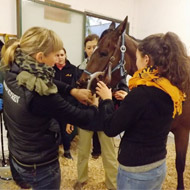
Research assess effect of diet change on omeprazole
A new study has confirmed that a suitable diet can help manage equine gastric ulcer syndrome (EGUS).
The research, presented at the International Colic Symposium (July 20), found that a change in diet was able to maintain the beneficial effect of pharmaceutical treatment, even after treatment had finished.
The research was conducted by researchers in Denmark, Madrid and Glasgow, in collaboration with SPILLARS and the WALTHAM Equine Studies Group.
Clare Barfoot, research and development manager at SPILLERS, commented: “This exciting work confirms what we suspected; that whilst appropriate dietary change can provide additional support to medical treatment for EGUS most importantly it can help maintain better gastric health post medical treatment.”
EGUS can affect any horse and refers to the ulceration of the animal’s stomach lining. Several factors, including nutrition, have been proven to raise the risk of ulcers occurring, particularly in the non-glandular part of the stomach.
Dietary and management changes are often recommended to help cut the risk of EGUS and are often recommended for use in conjunction with pharmaceutical treatment. Until now, however, there has been little research to confirm their benefit under such circumstances.
In the study, researchers assessed the effect of dietary change in combination with pharmaceutical treatment (omeprazole) and after the treatment had finished. The 32 horses used in the trial had been diagnosed with significant equine squamous gastric disease (ESGD) and were in hard work.
The horses were paired according to their workload and severity of their ulcers. One of each pair was randomly assigned to a specified low starch, fibre-based diet while the other stayed on their original diet. All animals were scoped before, after the recommended course of omeprazole treatment and then six weeks after the omeprazole finished.
Researchers found that horses on their original diet improved significantly with the omeprazole but when the treatment was stopped many regressed. Overall, by the end of the trial they were not significantly different to when they had started.
However, the horses whose diet had changed showed significant improvement, not only following the omeprazole treatment but also after the treatment had stopped. This showed that a change in diet was able to help maintain the beneficial effect of omeprazole, even after it was removed.
The study achieved an award in 2016 for research in horse welfare from the Fundación para la Promoción del Deporte Ecuestre, Spain.
Image (C) Nanna Luthersson.



 The latest
The latest